介绍了windows下对Explorer的拷贝动作的精确截获,这个在企业数据安全dlp产品系列中减少审计的噪音很有效,方便运营人员做针对性的审计。
在企业数据安全中我通常需要监测用户的拷贝行为,特别像explorer这样的进程,方法很多比如文件过滤驱动监测文件的打开与读写,但是这样会有很多噪音产生,实现的不好的话也可能会造成用户在桌面操作感受不良好,比如卡,所以我们需要的是一种更精准地方法,下面我们就来分析下如何去更加精准的定位拷贝。
一、 分析
我们都知道windows软件读写的方法很多比如c库一些读写函数,fopen 、fread、fwrite,c++流函数std::stream,但是都会进入windows的底层读写,还有一类文件操作函数就是Shell函数SHFileOperation,不管什么函数最后都会调用windows自己常用的文件操作函数就是CreateFileA、CreateFileW、ReadFile、WriteFile,我们可以使用调试器去在CreateFileW函数设置断点,但是这个一个问题我们必须在explorer进程空间里设断点,但是会阻碍正常的桌面UI操作,为了方便我们操作桌面,写一个文件过滤驱动,去过滤我们需要的信息,比如我们把一个.txt文件从目录A拷贝到目录B,我们可以在过滤驱动的IRP_MJ_CREATE的例程函数里这样写
啊
CErrorStatus PreCreate( CIrp& Irp, zipmbool& IsIrpCompleted) { CFileObject FileObject; CErrorStatus Error = STATUS_SUCCESS; Irp.UseCurrentStackLocation(); CIoStackLocation Stack = Irp.StackLocation(); do { if( wcsstr(FileObject.FileName()->Buffer,L".txt")) { if (FileObject.RelatedFileObject()) { } } } while (FALSE); return Error; }
这样过滤会减少很多干扰,利用windbg的虚拟机的双机器调试。
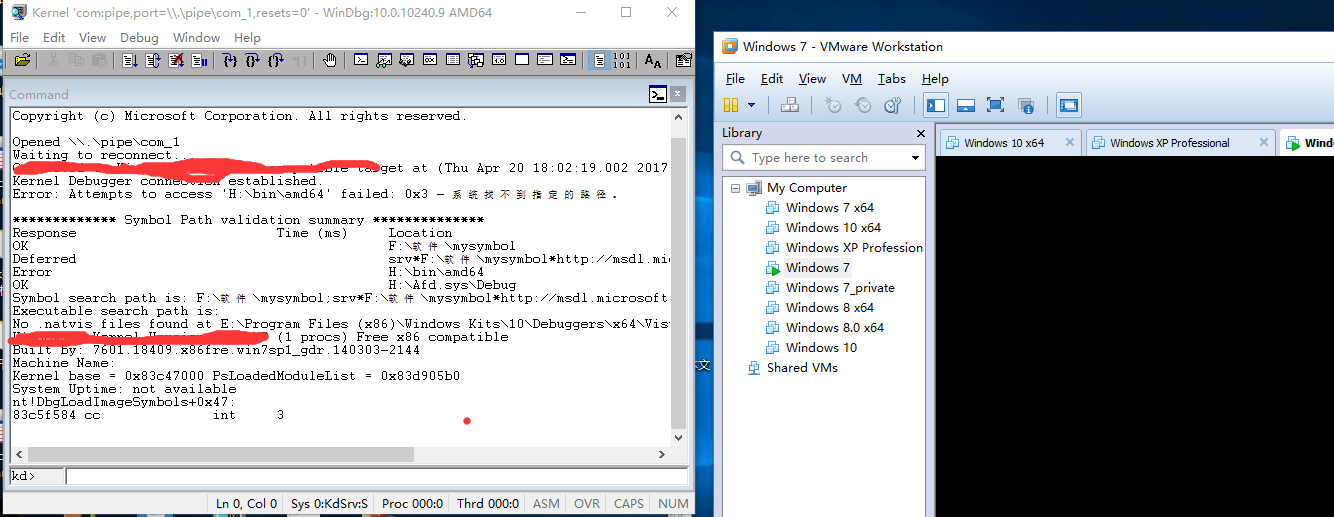
加载驱动后,我们可以设置断点在if ( FileObject.RelatedFileObject()),这行代码上。
然后拷贝一个txt的文件从A到B,如下图
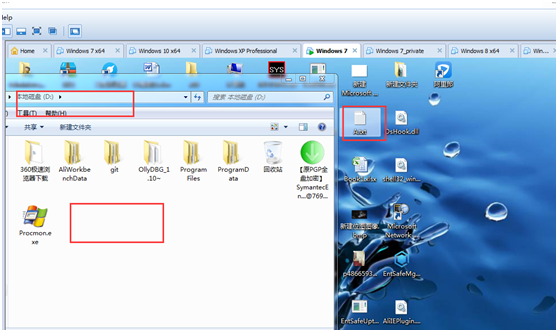
这里windbg调试器就会停下,进入刚才设置的断点位置。

输入命令kb
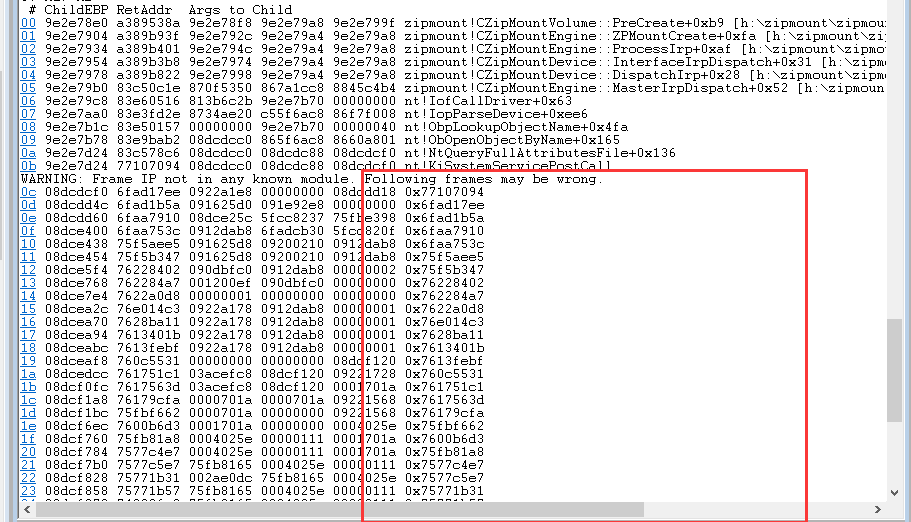
发现堆栈是从user层到内核层在到本驱动的PreCreate函数,这时user层显示的只是地址,是因为符号没加载,继续输入.reload /user,慢慢就显示了
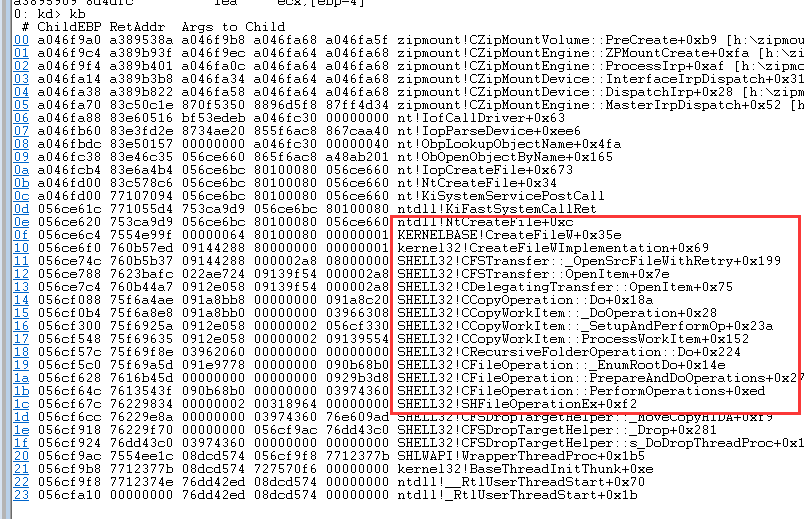
引起注意的是红色框显示的堆栈:
Nt!NtCreateFile
KernelBase!CreateFile
Kernel32!CreateFileWImplementation
Shell32!CFSTransfer:_OpenSrcFileWithRetry
Shell32! CFSTransfer::OpenItem
Shell32!CDelegatingTansfer:: OpenItem
Shell32! CCopyOperation::Do
Shell32! CCopyWorkItem::_DoOperation
Shell32! CCopyWorkItem::_SetupAndPerformOp
Shell32! CCopyWorkItem::ProcessWorkItem
Shell32!CRecursiveFolderoperation::Do
Shell32!CFileOperation::_EnumRootDo
Shell32!CFileOperation::PrepareAndDoOperation
Shell32!CFileOperation::PreformOperation
Shell32!SHFileOperationEx
由上可以看出最主要的是调用了SHFileOperationEx函数,这好说了,使用IDA打开shell32.dll分析这个函数
IDA显示这个函数调用了SHCreateFileOperation

继续跟进SHCreateFileOperation
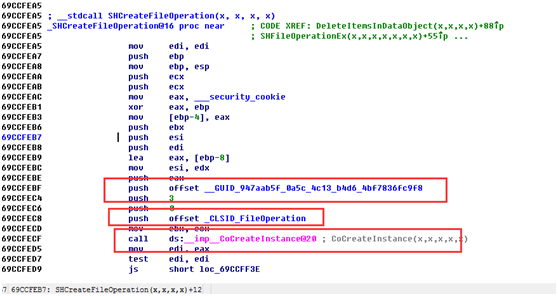
它创建的是GUID_947aab5f_0a5c_4c13_b4d6_4bf7836fc9f8这个类的实例,隶属于FileOperaton, 写过com的人都知道947aab5f_0a5c_4c13_b4d6_4bf7836fc9f8这个实例id就是com中的 IFileOperation的com库接口,查看windows的sdk定义如下
MIDL_INTERFACE("947aab5f-0a5c-4c13-b4d6-4bf7836fc9f8") IFileOperation : public IUnknown { public: virtual HRESULT STDMETHODCALLTYPE Advise( __RPC__in_opt IFileOperationProgressSink *pfops, __RPC__out DWORD *pdwCookie) = 0; virtual HRESULT STDMETHODCALLTYPE Unadvise( DWORD dwCookie) = 0; virtual HRESULT STDMETHODCALLTYPE SetOperationFlags( DWORD dwOperationFlags) = 0; virtual HRESULT STDMETHODCALLTYPE SetProgressMessage( __RPC__in_string LPCWSTR pszMessage) = 0; virtual HRESULT STDMETHODCALLTYPE SetProgressDialog( __RPC__in_opt IOperationsProgressDialog *popd) = 0; virtual HRESULT STDMETHODCALLTYPE SetProperties( __RPC__in_opt IPropertyChangeArray *pproparray) = 0; virtual HRESULT STDMETHODCALLTYPE SetOwnerWindow( __RPC__in HWND hwndOwner) = 0; virtual HRESULT STDMETHODCALLTYPE ApplyPropertiesToItem( __RPC__in_opt IShellItem *psiItem) = 0; virtual HRESULT STDMETHODCALLTYPE ApplyPropertiesToItems( __RPC__in_opt IUnknown *punkItems) = 0; virtual HRESULT STDMETHODCALLTYPE RenameItem( __RPC__in_opt IShellItem *psiItem, __RPC__in_string LPCWSTR pszNewName, __RPC__in_opt IFileOperationProgressSink *pfopsItem) = 0; virtual HRESULT STDMETHODCALLTYPE RenameItems( __RPC__in_opt IUnknown *pUnkItems, __RPC__in_string LPCWSTR pszNewName) = 0; virtual HRESULT STDMETHODCALLTYPE MoveItem( __RPC__in_opt IShellItem *psiItem, __RPC__in_opt IShellItem *psiDestinationFolder, __RPC__in_opt_string LPCWSTR pszNewName, __RPC__in_opt IFileOperationProgressSink *pfopsItem) = 0; virtual HRESULT STDMETHODCALLTYPE MoveItems( __RPC__in_opt IUnknown *punkItems, __RPC__in_opt IShellItem *psiDestinationFolder) = 0; virtual HRESULT STDMETHODCALLTYPE CopyItem( __RPC__in_opt IShellItem *psiItem, __RPC__in_opt IShellItem *psiDestinationFolder, __RPC__in_opt_string LPCWSTR pszCopyName, __RPC__in_opt IFileOperationProgressSink *pfopsItem) = 0; virtual HRESULT STDMETHODCALLTYPE CopyItems( __RPC__in_opt IUnknown *punkItems, __RPC__in_opt IShellItem *psiDestinationFolder) = 0; virtual HRESULT STDMETHODCALLTYPE DeleteItem( __RPC__in_opt IShellItem *psiItem, __RPC__in_opt IFileOperationProgressSink *pfopsItem) = 0; virtual HRESULT STDMETHODCALLTYPE DeleteItems( __RPC__in_opt IUnknown *punkItems) = 0; virtual HRESULT STDMETHODCALLTYPE NewItem( __RPC__in_opt IShellItem *psiDestinationFolder, DWORD dwFileAttributes, __RPC__in_opt_string LPCWSTR pszName, __RPC__in_opt_string LPCWSTR pszTemplateName, __RPC__in_opt IFileOperationProgressSink *pfopsItem) = 0; virtual HRESULT STDMETHODCALLTYPE PerformOperations( void) = 0; virtual HRESULT STDMETHODCALLTYPE GetAnyOperationsAborted( __RPC__out BOOL *pfAnyOperationsAborted) = 0; };
我们回到之前那个Ex函数,创建完IFileOperation的实例后,就开始调用里面的函数
分别调用了
Call dword ptr[esi+0x20h]
Call dword pre[esi+0x2Ch] 或者Call dword pre[esi+0x4Ch]
Call dword pre[esi+0x44h] 或者 Call dword pre[esi+0x3Ch]
其他函数都是设置Explorer的拷贝Item的属性的函数,+0×44这个函数对应的是IFileOperation::Copy Items,而+0x3C对应的函数是IFileOperation::Move tems,而我们这次的拷贝动作调用的就是IFileOperation::CopyItems,下面我们有方案了我们可以hook这个IFileOpertion的接口库实现精准截获桌面的拷贝动作。
一、 实现
以CopyItems为例子
定义一个CFileOperation类
#define QueryInterface_Index 0 #define AddRef_Index (QueryInterface_Index + 1) #define Release_Index (AddRef_Index + 1) #define Advice_Index (Release_Index + 1) #define Unadvise_Index (Advice_Index + 1) #define SetOperationFlags_Index (Unadvise_Index + 1) #define SetProgressMessage_Index (SetOperationFlags_Index + 1) #define SetProgressDialog_Index (SetProgressMessage_Index + 1) #define SetProperties_Index (SetProgressDialog_Index + 1) #define SetOwnerWindow_Index (SetProperties_Index + 1) #define ApplyPropertiesToItem_Index (SetOwnerWindow_Index + 1) #define ApplyPropertiesToItems_Index (ApplyPropertiesToItem_Index + 1) #define RenameItem_Index (ApplyPropertiesToItems_Index + 1) #define RenameItems_Index (RenameItem_Index + 1) #define MoveItem_Index (RenameItems_Index + 1) #define MoveItems_Index (MoveItem_Index + 1) #define CopyItem_Index (MoveItems_Index + 1) #define CopyItems_Index (CopyItem_Index + 1) #define DeleteItem_Index (CopyItems_Index + 1) #define DeleteItems_Index (DeleteItem_Index + 1) #define NewItem_Index (DeleteItems_Index + 1) #define PerformOperations_Index (NewItem_Index + 1) #define GetAnyOperationAborted_Index (PerformOperations_Index + 1) #define HOOK(a, b) b##_old = (P##b)HookVtbl(a, 0, b##_Index, (PBYTE)b##_new) class CFileOperation { public: CFileOperation(void); ~CFileOperation(void); int HookVtbl(void* pObject, unsigned int classIdx, unsigned int methodIdx, int newMethod); static HRESULT __stdcall CopyItems_new(IFileOperation *pThis, IUnknown *punkItems, IShellItem *psiDestinationFolder); BOOL Init(); };
在初始化的时候我们需要获取接口并却修改截获CopyItems和MoveItems的指针接口
BOOL CFileOperation::Init() { IFileOperation* Pf = NULL; CoInitialize( NULL ); do { HRESULT hr = CoCreateInstance( CLSID_FileOperation, NULL, CLSCTX_ALL, IID_IFileOperation, (PVOID*)&Pf); HOOK(Pf, CopyItems); } while (FALSE); } int CFileOperation::HookVtbl(void* pObject, unsigned int classIdx, unsigned int methodIdx, int newMethod) { int** vtbl = (int**)pObject; DWORD oldProtect = 0; int oldMethod = vtbl[classIdx][methodIdx]; VirtualProtect(vtbl[classIdx] + sizeof(int*) * methodIdx, sizeof(int*), PAGE_READWRITE, &oldProtect); vtbl[classIdx][methodIdx] = newMethod; VirtualProtect(vtbl[classIdx] + sizeof(int*) * methodIdx, sizeof(int*), oldProtect, &oldProtect); return oldMethod; } HRESULT CFileOperation::CopyItems_new(IFileOperation *pThis, IUnknown *punkItems, IShellItem *psiDestinationFolder) { HRESULT hr = CopyItems_old(pThis, punkItems, psiDestinationFolder); return hr; }
这里生成了dll后我们需要注入到桌面进程中,这样就可以实现截获CopyItems接口,注意这里只是完成了第一步,这个接口传进来的参数只是一个Item内存结构,我们需要获取具体的数据,下面继续。
从上面分析我们得知winvista以后的桌面拷贝操作最终使用的是IFileOperation接口,在shell32.dll里对应的就是CFileOperation类
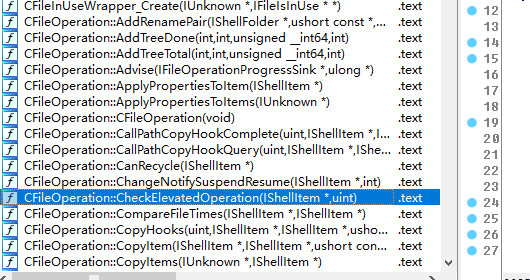
CopyItems对应的就是

继续进入
CFileOperation::_AddOperationMulti
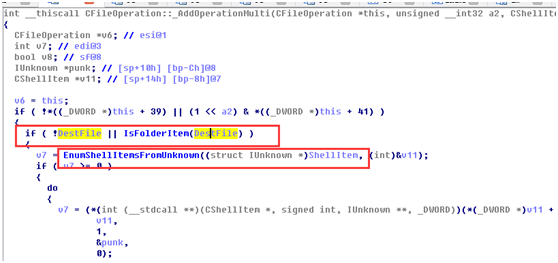
可以看到首先判断DestFile这个参数是否是Folder文件夹,如果是文件夹就是开始枚举ShellItem这个参数,我们继续进入EnumShellItemsFromUnknown函数


从上面我们看出该函数会QueryInterface各个接口:
_GUID_70629033_e363_4a28_a567_0db78006e6d7
_GUID_b63ea76d_1f85_456f_a19c_48159efa858b
_GUID_d0191542_7954_4908_bc06_b2360bbe45ba
_GUID_0000010e_0000_0000_c000_000000000046
如果以上接口都不存在的话,就调用
SHGetIDListFromObject、SHCreateShellItemArrayFromIDLists来获取接口,
在实际调用中发现以上几个不是所有操作系统都支持,而最后两个函数却支持winvista以后的所有系统,所以我们就用最后两个函数来获取源信息,而这两个函数在shell32.dll都是导出的接口定义如下:
HRESULT SHCreateShellItemArrayFromIDLists(
_In_ UINT cidl,
_In_ PCIDLIST_ABSOLUTE_ARRAY rgpidl,
_Out_ IShellItemArray **ppsiItemArray
);
最后获取的是IShellItemArray接口,接口定义为:
MIDL_INTERFACE("b63ea76d-1f85-456f-a19c-48159efa858b") IShellItemArray : public IUnknown { public: virtual HRESULT STDMETHODCALLTYPE BindToHandler( /* [unique][in] */ __RPC__in_opt IBindCtx *pbc, /* [in] */ __RPC__in REFGUID bhid, /* [in] */ __RPC__in REFIID riid, /* [iid_is][out] */ __RPC__deref_out_opt void **ppvOut) = 0; virtual HRESULT STDMETHODCALLTYPE GetPropertyStore( /* [in] */ GETPROPERTYSTOREFLAGS flags, /* [in] */ __RPC__in REFIID riid, /* [iid_is][out] */ __RPC__deref_out_opt void **ppv) = 0; virtual HRESULT STDMETHODCALLTYPE GetPropertyDescriptionList( /* [in] */ __RPC__in REFPROPERTYKEY keyType, /* [in] */ __RPC__in REFIID riid, /* [iid_is][out] */ __RPC__deref_out_opt void **ppv) = 0; virtual HRESULT STDMETHODCALLTYPE GetAttributes( /* [in] */ SIATTRIBFLAGS AttribFlags, /* [in] */ SFGAOF sfgaoMask, /* [out] */ __RPC__out SFGAOF *psfgaoAttribs) = 0; virtual HRESULT STDMETHODCALLTYPE GetCount( /* [out] */ __RPC__out DWORD *pdwNumItems) = 0; virtual HRESULT STDMETHODCALLTYPE GetItemAt( /* [in] */ DWORD dwIndex, /* [out] */ __RPC__deref_out_opt IShellItem **ppsi) = 0; virtual HRESULT STDMETHODCALLTYPE EnumItems( /* [out] */ __RPC__deref_out_opt IEnumShellItems **ppenumShellItems) = 0; };
大致我们可以写出获取信息的文件的函数
UINT GetFilesFromDataObjectWin( IUnknown *iUnknown, LPWSTR **ppPath) { HRESULT hr = E_FAIL; LPITEMIDLIST Pv = NULL; int nCount = 0; IShellItemArray* ShellItemArray = NULL; do { __try { hr = SHGetIDListFromObject(iUnknown,&Pv); if ( FAILED(hr) ) { break; } hr = SHCreateShellItemArrayFromIDLists( TRUE, (LPCITEMIDLIST *)&Pv, &ShellItemArray); if ( FAILED(hr) ) { break; } hr = ShellItemArray->GetCount((ULONG*)&nCount); if ( !nCount ) { break; } *ppPath = new LPWSTR[nCount]; memset(*ppPath,0,sizeof(LPWSTR)*nCount); for ( int Index = 0 ; Index < nCount ; Index++) { IShellItem* ShellItem = NULL; if( SUCCEEDED(ShellItemArray->GetItemAt( Index, &ShellItem))) { if ( ShellItem /*&& ShellItem->GetAttributes( 0x20000000, &GAof ) == 0 */) { LPWSTR Temp = NULL; if(SUCCEEDED(ShellItem->GetDisplayName( SIGDN_FILESYSPATH, &Temp))) { __try { if ( Temp ) { int Length = wcslen(Temp); *ppPath[Index] = new WCHAR[Length + 1]; memset(*ppPath[Index],0,sizeof(WCHAR)*(Length + 1)); wcsncpy( *ppPath[Index], Temp, Length); CoTaskMemFree(Temp); Temp = NULL; } } __except(EXCEPTION_EXECUTE_HANDLER) { if ( Temp ) { CoTaskMemFree(Temp); Temp = NULL; } } } } if ( ShellItem ) { ShellItem->Release(); } } } } __finally { if ( ShellItemArray ) { ShellItemArray->Release(); } if ( Pv) { CoTaskMemFree(Pv); } } } while (FALSE); return nCount; }
以上是获取源文件的信息,而拷贝目的的信息获取就很简单了,CopyItem的定义的目的中的参数
IShellItem *psiDestinationFolder,中的IShellItem 定义如下
MIDL_INTERFACE("43826d1e-e718-42ee-bc55-a1e261c37bfe") IShellItem : public IUnknown { public: virtual HRESULT STDMETHODCALLTYPE BindToHandler( /* [unique][in] */ __RPC__in_opt IBindCtx *pbc, /* [in] */ __RPC__in REFGUID bhid, /* [in] */ __RPC__in REFIID riid, /* [iid_is][out] */ __RPC__deref_out_opt void **ppv) = 0; virtual HRESULT STDMETHODCALLTYPE GetParent( /* [out] */ __RPC__deref_out_opt IShellItem **ppsi) = 0; virtual HRESULT STDMETHODCALLTYPE GetDisplayName( /* [in] */ SIGDN sigdnName, /* [string][out] */ __RPC__deref_out_opt_string LPWSTR *ppszName) = 0; virtual HRESULT STDMETHODCALLTYPE GetAttributes( /* [in] */ SFGAOF sfgaoMask, /* [out] */ __RPC__out SFGAOF *psfgaoAttribs) = 0; virtual HRESULT STDMETHODCALLTYPE Compare( /* [in] */ __RPC__in_opt IShellItem *psi, /* [in] */ SICHINTF hint, /* [out] */ __RPC__out int *piOrder) = 0; };
根据定义我们就可以通过GetDisplayName去获取目的文件的信息:
BOOL GetDestFolder(IShellItem* psiDestinationFolder, LPWSTR* lpDst ) { do { HRESULT hr = psiDestinationFolder->GetDisplayName( SIGDN_FILESYSPATH, lpDst); if(FAILED(hr)) { break; } return TRUE; } while (FALSE); return FALSE; }
综合起来,我们可以实现如下:
HRESULT CFileOperation::CopyItems_new(IFileOperation *pThis, IUnknown *punkItems, IShellItem *psiDestinationFolder) { HRESULT hr = CopyItems_old(pThis, punkItems, psiDestinationFolder); LPWSTR lpDst = NULL; PWSTR* lpSrc = NULL; //获取目的信息 GetDestFolder(psiDestinationFolder, &lpDst) ); //获取源文件信息 GetFilesFromDataObjectWin(punkItems, &lpSrc); return hr; }
至此我们就很就精准地截获了windows桌面程序的拷贝、剪切的具体动作,也获取详细的文件名称,我们甚至还能准确地得知该动作是否成功,更加详细的信息就留给读者去研究,总之shell32.dll是个很值得开发人员去研究的,里面有很多意想不到的东西,甚至能写出很简单的程序实现很复杂有效的功能,可以充分利用windows系统给我们提供的便捷的库。
引用